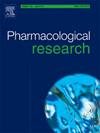投稿信息
稿件收录要求
Pharmacological Research publishes cutting-edge articles in biomedical sciences to cover a broad range of topics that move the pharmacological field forward. We provide a venue through which specialists across disciplines can rapidly exchange information in health sciences that pertains to modern pharmacological topics. The journal publishes articles on molecular, biochemical, translational, and clinical research (including clinical trials); it is proud of its rapid publication of accepted papers that comprises a dedicated, fast acceptance and publication track for high profile articles.
Invited and unsolicited review articles are welcome.
Journal Sections
Specific sections are dedicated to:
The cardiovascular system:
- CV disease therapy;
- Signal transduction and receptor pharmacology in the CV system;
- Target organs;
- Clinical trials.
Neuroscience, including psychopharmacology, and neuroendocrinology:
- Understanding of the central nervous system in physiological and pathological conditions;
- Neuropharmacological and molecular mechanisms of learning and memory;
- Therapeutic and diagnostic challenges for mental illness and neurodegerative diseases;
- System biology.
Oncology:
- Targeted cancer therapy;
- Precision medicine and personalized therapy;
- Signal transduction studies, as related to drug action;
- Clinical trials.
Immunology (clinical and basic):
- Immune and inflammatory mechanisms including target identification;
- Immunotherapy and immunotoxicology;
- Immunopathology;
- Vaccines and adjuvants;
- Treatment of infectious diseases.
Redox regulators and biological gases in pathophysiology:
- Oxidative and nitrative stress and cell dysfunction;
- Redox regulation of signal transduction in various diseases;
- Pathophysiological roles of NO, CO and H2S;
- Interaction between oxidants and gaseous mediators in health and disease;
- Pharmacological modulators of oxidants, free radicals and gaseous transmitters.
Renal Pathophysiology and Pharmacology:
- Acute and chronic kidney injury disease;
- Metabolic alkalosis and metabolic acidosis in renal disease;
- Renal excretion in electrolyte disorders;
- Diabetes insipidus, Diabetic nephropathy;
- Pathogenesis of glomerular disease;
- End stage renal disease;
- Prevention and treatment of nephrotic diseases.
Pregnancy Related Pharmacology and Perinatal Therapeutics:
- Drug effects on the mother and foetus before and after birth;
- Placental barrier and its relationship with drugs (transportation metabolism and so on);
- Molecular signalling in placenta and identification of mechanisms beyond drug action in pregnancy;
- Adverse effects of drugs drug/combination in placenta;
- Drug repurposing/reprogramming for placenta-related disorders;
- Regulatory aspects beyond clinical research in pregnant mothers;
- Placenta remodelling in disease;
- In vivo models of the diseased placenta;
- The microbioma;
- Effects of the environment on pregnancy;
- Preventive vs therapeutic use of drugs.
Pharmacogenomics, Pharmacogenetics and Precision Medicine:
- We are especially interested in GWAS studies and studies reporting pharmacogenetic data that are relevant in terms of safety and efficacy of drugs. They must provide insight into novel genomic or therapeutic associations that can help guide therapy selection or suggest new indications for established drugs. Studies can also provide details of exceptional responses in limited numbers of patients.
- We also publish n=1 studies of exceptional responses, provided they are backed up by compelling genomic or experimental data.
- Studies must include full clinical description of the case, along with details of the response and supporting molecular information. The molecular information should support the clinical observations and offer a definitive pharmacogenomic insight. Standard clinical sequencing assays (Foundation ONE, Genoptix etc) are only appropriate when the therapeutic or phenotypic response is novel. Ideally, the observational patient studies should be supported by lab based functional data.
Bioactive molecules derived from medicinal plants or natural products:
- New, effective bioactive molecules;
- Drug target identification;
- Treatment mechanism;
- Mechanism investigation with -omics and computational technologies;
- Combinational therapy with natural products;
- Multi-targeting and network pharmacology;
- Herbal bioinformatics;
- Precision medicine of natural products;
- Evidenced-based research and clinical trials.
Studies reporting on plant extracts in which the active principle(s) has not been defined do not fall into the scope of this journal. Exceptions can be made for papers addressing the mechanisms of actions or the clinical applications of standardized herbal preparations. Clinical studies on commercially-available nutraceuticals are also taken into consideration.
Rare diseases and orphan drugs, and drug repositioning
We also publish articles focusing on:
- Gastrointestinal and urogenital apparatuses when involving pharmacological issues;
- Pharmacology of tissue repair/regeneration;
- Pharmacology of aging;
- Nutraceuticals (if relevant to human disease);
- Pharmacoeconomy;
- Pharmacoepidemiology.
We do not publish:
- Papers reporting pharmacological activities of novel compounds if no proper controls with known substances are performed;
- Bioequivalence studies or studies reporting only the pharmacokinetics profile of a compound;
- Descriptive pharmacovigilance studies;
- Single dose/concentration studies and those measuring only one endpoint.




